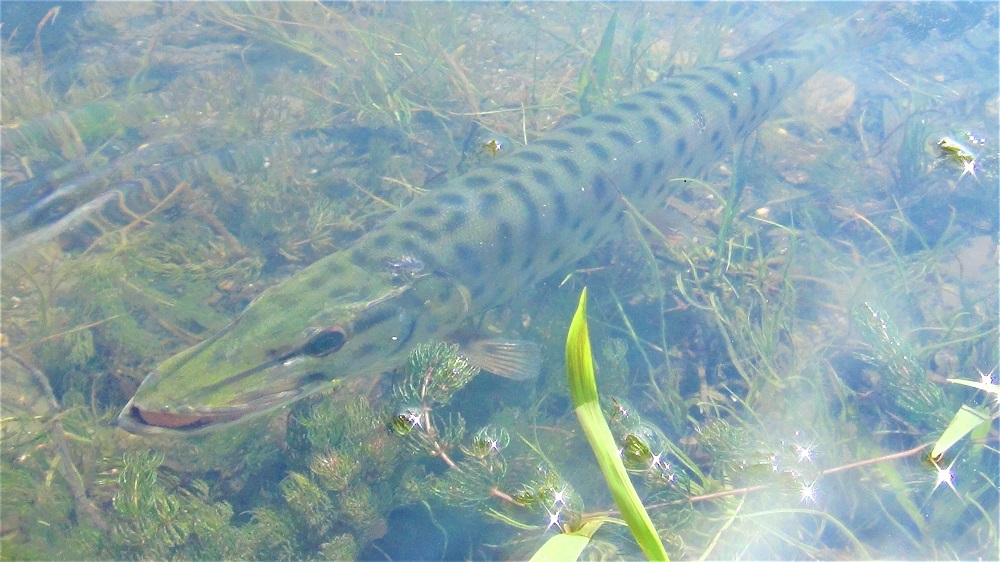
Photo by Brian Metzke.


Photo by Brian Metzke.
It is likely safe to say that every angler has had a day on the water when they didn’t catch any fish. Even if someone uses their trusty lure at their go-to spot, sometimes they still end up empty handed. It is not that the fish have all left the lake. Rather, for some odd reason, they decided not to bite, and you went home with nothing but a bunch of lures you cleaned in the lake.
If you are an angler targeting muskie, you know the feeling of going home empty handed, despite your best efforts, more than most. To the uninitiated, muskies are affectionately known as “the fish of 10,000 casts,” and for good reason – anglers can spend years patiently working the water in hopes of landing a 48-inch monster, but with no success. Muskies are frustratingly elusive and have flummoxed many anglers.

Researchers at the University of Illinois recently set out on a project funded by the Illinois Department of Natural Resources to try and learn more about why muskies strike lures (or, more accurately, do NOT strike lures) with a controlled laboratory experiment. To do this, researchers obtained muskies from a Jake Wolf Memorial Fish Hatchery and took them to their research lab. All fish were then outfitted with an individual identification tag, and then put through a series of tests to quantify their “personality.” For example, fish were placed individually inside a small box in a tank, and the time it took each fish to emerge from the box was measured, which equated to a measure of boldness. Bold fish emerged from the box quickly and were happy to explore the tank, while shy fish took longer to emerge, if they emerged at all. Fish were then shown a mirror so it could see a reflection of itself. Fish that were aggressive started posturing and interacting with their reflection in an attempt to establish dominance were considered ‘aggressive.’ Fish that slunk back into their shelter were deemed ‘passive.’ Measures of activity (distance swam during the trial) were also taken. A subset of fish also were assayed for their metabolic rate, or how quickly they consumed oxygen, which loosely equates to how fast their engines were running.
After this lab work was completed, researchers were able to get to the fun part – fishing! More specifically, fish that had been tested in the lab were transferred into two small ponds at the research site for fishing trials. Researchers spent the next month fishing the ponds using a variety of lures, techniques and strategies in an effort to catch as many fish as possible.

Two patterns emerged when lab testing and fishing results were combined. First, the catch of muskies in the ponds was not random. Rather, there were differences in the ‘personalities’ of fish that were caught compared to those that were not caught. Fish that we angled, or caught, were the fish identified as ‘shy,’ or less active, less exploratory and less aggressive. Active fish, or those that interacted a lot with the mirror, were caught less often. Second, the number of fish caught was highest on the first day of fishing, and then declined sharply after that, with researchers spending many days fishing later in the study with no catches.
When these two findings are combined there are some interesting implications for muskie fishing. One key takeaway is that catching muskies is not random and certain fish are more likely to be caught than others. Muskie catch was predicted by low activity and low aggression – essentially, catching lazy fish. This is an interesting contrast to other similar research with common carp, for example, where catch was predicted by fish that were bold, active and swam around a lot. When you think about this result from an ecological perspective, though, it makes sense. Muskies are solitary top predators that prefer to sit under a log or along a weed edge, and they are built to ambush unsuspecting prey that happens by. Carp are active foragers that swim around the lake rummaging through the lake bottom for food. So, the fact that fish with lazy, inactive personality types were caught more makes sense, and matches what you might expect in the field. Active muskies swimming around are not as vulnerable to fishing.

A second key takeaway relates to the decline in catch rates. When fishing in artificial ponds like the ones in this study, a decline in catch rates is to be expected and is common. However, the rate at which catch rates fell off was somewhat startling and exceeds what has been seen in other fish. In pond studies with bluegill, for example, researchers can keep catching fish for weeks, but in this study, muskies turned off after a few days and started avoiding lures. This could have happened if fish became oriented to the presence of anglers, or else saw other fish from the ponds be caught (a process known as social learning). Regardless, researchers in this study saw full well how wary and elusive muskies can be, even with just a few days of fishing.
These results can, hopefully, help anglers catch more muskies. Though not tested explicitly, the fact that muskies seemed to learn to avoid lures quickly highlights the need for ‘surprise’ to find unsuspecting fish that haven’t been influenced by past anglers. Don’t be afraid to show muskies something different. Try a new lure, or an old lure that hasn’t been used in a while. Fishing early in the year before other anglers have been on the water might help target animals that haven’t encountered an angler in a while.

These results also have some important conservation implications and emphasize the need for the use of best practices and catch-and-release fishing for muskies. Muskie strikes are not random, and certain fish are more likely to be caught based on their personality. It is therefore vital that fish are treated gently, returned to the water quickly, and angling impacts, injuries and disturbances are minimized. Keeping these vulnerable fish healthy and producing offspring that may also be more susceptible to fishing is key to ensuring sustainable and fun muskie fisheries into the future.
So, the next time you are out fishing for muskie but not catching any, don’t despair. You likely presented your lure in front of a few fish, but they were not the right personality type. It may be that another angler set their alarm just a few minutes before yours and already tempted the muskies. Continue your journey of 10,000 casts—one muskie will surely rise to your offering.
Cory Suski is a professor in the Department of Natural Resources and Environmental Sciences at the University of Illinois. For almost 20 years he has conducted research on many aspects of fishing.
Submit a question for the author